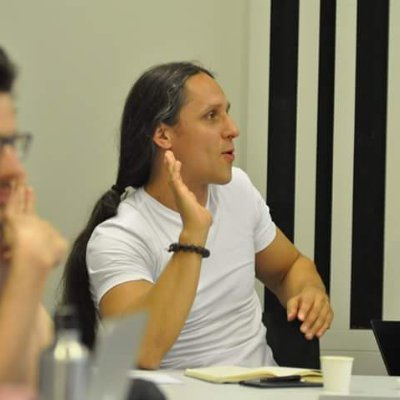One of the speakers at The Organic and the Normative conference, taking place between July 30–August 1, 2024 in Ljubljana, Slovenia, is going to be Sebastjan Vörös.
Sebastjan Vörös is Associate Professor of Philosophy at the Faculty of Arts, University of Ljubljana, Slovenia. His research interests encompass philosophy of science, epistemology, phenomenology, and philosophy of religion. He is the author of Podobe neupodobljivega (The Images of the Unimaginable; KUD Logos & University of Ljubljana Press 2013, 2015), in which he investigates the phenomenon of mystical experiences from neuroscientific, phenomenological, and gnoseological perspectives. He has (co)edited numerous articles and special issues centered on embodiment, enaction and (neuro)phenomenology, with a special emphasis on Francisco Varela’s contributions to these fields. Additionally, he has translated several important philosophical texts into Slovene: in addition to works by A. Damasio, D. Dennett, W. James and A. N. Whitehead, Sebastjan has also translated and edited The Embodied Mind by F. Varela, E. Thompson, and E. Rosch. Finally, he is the head of the transdisciplinary institute-in-the-making Metanoia, and is currently – painfully slowly, yet arduously – writing a book on the philosophical and scientific work of Francisco Varela.
Highlighted Article
Vörös, S. (2023). Vörös, Sebastjan. (2023) “Is There Not a Truth of Vitalism? Vital Normativity in Canguilhem and Merleau-Ponty”. Vitalism and Its Legacy in Twentieth Century Life Sciences and Philosophy. https://doi.org/10.1007/978-3-031-12604-8_9
The paper investigates the phenomenon of vitalism through the lens of vital normativity as expounded by Maurice Merleau-Ponty and Georges Canguilhem. I argue that the two authors independently developed complementary critiques of the mechanical-behaviourist conception of life sciences, which culminated in a surprisingly similar notion of life construed as a normative (polarized) activity, i.e., an activity that is not indifferent to its own conditions of possibility. Such an alternative conception of life has far-reaching consequences for the epistemology of life sciences, for it requires it to reconsider not only its object of inquiry – the nature of (the relationship between) an organism and its environment -, but also, since scientists themselves are living beings, the nature of its epistemic practices. What I call the truth of (a specific variety of) vitalism is thus reflected not only in how life is cognized, but also in how life cognizes (itself). This last point is of particular philosophical importance, as it paves the way towards a more dynamic conception of reflection (tentatively called ouroboric thought), which takes seriously that we, as cognizers of life, at the same time live the lives of cognizers.
